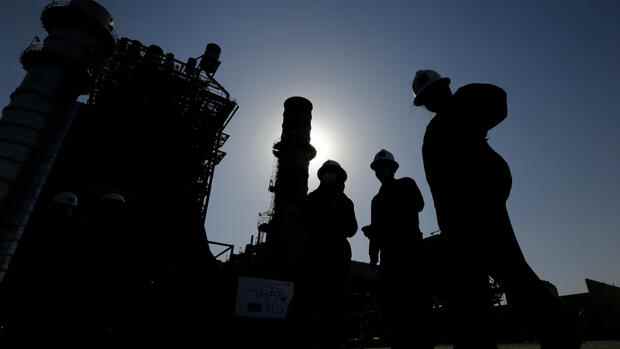Abu Dhabi Chancellor Olaf Scholz (SPD) will not return empty-handed from his two-day trip to the Arabian Peninsula: Germany and the United Arab Emirates (UAE) are expanding their energy partnership. The governments of both countries signed a framework agreement during Scholz’s visit to Abu Dhabi on Sunday, which was accompanied by numerous corporate deals.
The energy group RWE agreed on a contract for the first delivery of liquefied natural gas (LNG). The agreement with the state-owned Abu Dhabi National Oil Company (Adnoc) provides for an initial delivery of 137,000 cubic meters of LNG in December, which will come to Germany via a floating terminal in Brunsbüttel.
“In addition, Adnoc has reserved a number of other LNG cargoes exclusively for German customers in 2023,” the joint statement from both governments reads. It is also mentioned that the Hoyer company intends to import up to 250,000 tons of diesel per month.
The December delivery is only a fraction of what Germany received from Russia in the past: in 2020, the Federal Republic imported around 56 billion cubic meters of natural gas from the country via pipelines. 137,000 cubic meters is 0.00024 percent of this amount.
Top jobs of the day
Find the best jobs now and
be notified by email.
Scholz emphasized in Abu Dhabi how important it is to rely on as many suppliers as possible for the energy supply: “The fact that you are dependent on one supplier and are also dependent on their decisions will certainly not happen to us again.” Germany will become an infrastructure for gas imports, with which the country “is no longer directly dependent on the specific supplier at the other end of the pipeline, as is the case with a pipeline connection”.
Also agreements on hydrogen
Until the Russian war of aggression against Ukraine, Germany still obtained 55 percent of its natural gas from Russia. In the meantime, deliveries from there have largely stopped and the German gas suppliers are looking for new sources of supply. The United Arab Emirates have the seventh largest natural gas reserves in the world.
Sunday’s statement went on to say that Adnoc has also made a number of agreements with German firms, including Steag and Aurubis. It is said to be about deliveries of low-carbon ammonia, a carrier fuel for hydrogen. The first of these loads had already arrived in Hamburg at the beginning of September. Both countries wanted to explore further possibilities for cooperation along the entire hydrogen value chain.
In addition, the VAE company Masdar is to become more active in the offshore wind markets in the German North and Baltic Seas. A production capacity of up to ten gigawatts of renewable energies is aimed for by 2030, “provided that the necessary political and regulatory requirements of both countries are met”.
The Federal Chancellor met the President of the United Arab Emirates in Abu Dhabi.
(Photo: via REUTERS)
“With the Energy Security and Industry Accelerator (Esia) agreement, we are enabling the rapid implementation of strategic lighthouse projects in the priority areas of renewable energies, hydrogen, LNG and climate protection,” said Scholz.
The Chancellor also visited Qatar during his two-day trip. On the night of Sunday it became known that the Arab country involved the French energy company Total Energies in another area of a liquefied gas project, with which Qatar wants to significantly increase its ability to export liquefied gas.
The French group will thus become Qatar’s first international partner in what it says is the world’s largest liquefied gas project. According to the project, Total is increasing its liquid gas capacity by 3.5 million tons per year.
American pressure
When asked about the deal, Scholz said it was important “that such projects are now completed everywhere”. The point is to serve the high demand without having to resort to the Russian production capacities.
High-level visits to Qatar have been on the rise lately. Two and a half weeks before the Federal Chancellor, EU Council President Charles Michel paid his respects to the Emir. However, the Europeans are seen as difficult negotiating partners. The Qatari side said they were reluctant to enter into long-term supply relationships due to their ambitious climate goals. In Asia, on the other hand, there are fewer inhibitions about concluding contracts with a term of 20 years, which is why the business conditions there are more favorable. The Qataris are also annoyed by the calls for a boycott of the World Cup, which are getting louder and louder in Europe.
>>> Also read: Risk of billions Margin calls: The underestimated problem in the energy crisis
However, the fact that the Europeans did not end up empty-handed seems to have less to do with European negotiating skills than with pressure from the Americans: The USA had made it clear that they expected Qatar to help ease the energy crisis in Europe, but the emirate is closed Listen. The American insistence made an impression on the royal family.
Chancellor Scholz began his trip to Saudi Arabia on Saturday and met Crown Prince Mohammed bin Salman there. He also addressed the murder of journalist Jamal Khashoggi. Scholz said after the talks in the port city of Jeddah that “all issues were discussed” that revolved around civil and human rights. “That’s how it should be. And you can be sure that nothing that needs to be said has remained undiscussed.” The Crown Prince and Chancellor greeted each other with a strong handshake and a friendly smile.
More: Rivals in the cabinet: why the dispute between Habeck and Lindner is escalating
